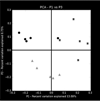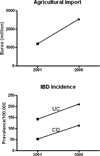Monotonous diets protect against acute colitis in mice: epidemiologic and therapeutic implications
- PMID: 23085891
- PMCID: PMC4030530
- DOI: 10.1097/MPG.0b013e3182769748
Monotonous diets protect against acute colitis in mice: epidemiologic and therapeutic implications
Abstract
Objectives: Multiple characteristics of industrialization have been proposed to contribute to the global emergence of inflammatory bowel diseases (IBDs: Crohn disease and ulcerative colitis). Major changes in eating habits during the last decades and the effectiveness of exclusive enteral nutrition in the treatment of Crohn disease indicate the etiologic importance of dietary intake in IBDs. A uniform characteristic of nutrition in developing countries (where the incidence of IBD is low) and exclusive enteral nutrition is their consistent nature for prolonged periods; however, the potentially beneficial effect of dietary monotony in respect to mammalian intestinal inflammation has not been examined.
Methods: The association between alternating (2 different complete chows) and persistent regular diets, and dextran sulfate sodium colitis susceptibility in C57BL/6J mice was studied. Colonic mucosal microbiota changes were investigated by high-throughput pyrosequencing of the 16S rRNA gene.
Results: The severity of colitis increased upon dietary alternation compared with consistent control feeding. The microbiota of the alternating nutritional group clustered discretely from both control groups.
Conclusions: Our findings highlight that monotonous dietary intake may decrease mammalian vulnerability against colitis in association with microbiota separation. The epidemiologic and therapeutic implications of our results are also discussed.
Conflict of interest statement
Figures





Similar articles
-
Interactions Between Diet and the Intestinal Microbiota Alter Intestinal Permeability and Colitis Severity in Mice.Gastroenterology. 2018 Mar;154(4):1037-1046.e2. doi: 10.1053/j.gastro.2017.11.030. Epub 2017 Nov 23. Gastroenterology. 2018. PMID: 29174952 Free PMC article.
-
Extracellular vesicles derived from gut microbiota, especially Akkermansia muciniphila, protect the progression of dextran sulfate sodium-induced colitis.PLoS One. 2013 Oct 24;8(10):e76520. doi: 10.1371/journal.pone.0076520. eCollection 2013. PLoS One. 2013. PMID: 24204633 Free PMC article.
-
Changes in the composition of intestinal fungi and their role in mice with dextran sulfate sodium-induced colitis.Sci Rep. 2015 May 27;5:10416. doi: 10.1038/srep10416. Sci Rep. 2015. PMID: 26013555 Free PMC article.
-
Insufficient dietary choline aggravates disease severity in a mouse model of Citrobacter rodentium-induced colitis.Br J Nutr. 2021 Jan 14;125(1):50-61. doi: 10.1017/S0007114520002639. Epub 2020 Aug 14. Br J Nutr. 2021. PMID: 32792032
-
Phylotype-level 16S rRNA analysis reveals new bacterial indicators of health state in acute murine colitis.ISME J. 2012 Nov;6(11):2091-106. doi: 10.1038/ismej.2012.39. Epub 2012 May 10. ISME J. 2012. PMID: 22572638 Free PMC article.
Cited by
-
Cellulose supplementation early in life ameliorates colitis in adult mice.PLoS One. 2013;8(2):e56685. doi: 10.1371/journal.pone.0056685. Epub 2013 Feb 20. PLoS One. 2013. PMID: 23437211 Free PMC article.
-
Intestinal barrier permeability: the influence of gut microbiota, nutrition, and exercise.Front Physiol. 2024 Jul 8;15:1380713. doi: 10.3389/fphys.2024.1380713. eCollection 2024. Front Physiol. 2024. PMID: 39040079 Free PMC article. Review.
-
Prenatal methyl-donor supplementation augments colitis in young adult mice.PLoS One. 2013 Aug 19;8(8):e73162. doi: 10.1371/journal.pone.0073162. eCollection 2013. PLoS One. 2013. PMID: 23977377 Free PMC article.
-
Microbiome associations of therapeutic enteral nutrition.Nutrients. 2014 Nov 21;6(11):5298-311. doi: 10.3390/nu6115298. Nutrients. 2014. PMID: 25421531 Free PMC article. Review.
-
Animal models of gastrointestinal and liver diseases. New mouse models for studying dietary prevention of colorectal cancer.Am J Physiol Gastrointest Liver Physiol. 2014 Aug 1;307(3):G249-59. doi: 10.1152/ajpgi.00019.2014. Epub 2014 May 29. Am J Physiol Gastrointest Liver Physiol. 2014. PMID: 24875098 Free PMC article. Review.
References
-
- Molodecky NA, Soon IS, Rabi DM, et al. Increasing incidence and prevalence of the inflammatory bowel diseases with time, based on systematic review. Gastroenterology. 2012;142:46–54. e42. quiz e30. - PubMed
-
- Sartor RB. Mechanisms of disease: pathogenesis of Crohn's disease and ulcerative colitis. Nat Clin Pract Gastroenterol Hepatol. 2006;3:390–407. - PubMed
-
- Halfvarson J. Genetics in twins with Crohn's disease: less pronounced than previously believed? Inflamm Bowel Dis. 2011;17:6–12. - PubMed
-
- Day AS, Whitten KE, Sidler M, et al. Systematic review: nutritional therapy in paediatric Crohn's disease. Aliment Pharmacol Ther. 2008;27:293–307. - PubMed
-
- Rubio A, Pigneur B, Garnier-Lengline H, et al. The efficacy of exclusive nutritional therapy in paediatric Crohn's disease, comparing fractionated oral vs. continuous enteral feeding. Aliment Pharmacol Ther. 2011;33:1332–1339. - PubMed
Publication types
MeSH terms
Substances
Grants and funding
LinkOut - more resources
Full Text Sources
Other Literature Sources
Medical

